
In recent years, climate change has become increasingly evident. In the face of nearly incontrovertible evidence that human presence is severely affecting the planet, we are all being encouraged to live more sustainable lives. In response to this worldwide call to sustainability, Abu Dhabi, United Arab Emirates, has put in to motion plans for the world’s first carbon-neutral city.
The city, called Masdar, is located approximately 20 miles outside of Abu Dhabi. The city aims to be a “global hub for renewable energy and clean technology,” and will ideally be able to self-sustain with very low carbon emissions and energy consumption, according to the city’s main website.
While working for a sustainable future is admirable and important, a gated, theme-park-esque community is not the way to achieve that goal.
The city of Masdar will only be able to sustain a resident population of about 40,000 people, with another 50,000 expected to commute — which will require the burning of fossil fuels (at least until other forms of transportation to the city are developed in an estimated ten years).
But what about the other approximately 6.8 billion people on the planet? If everyone lived like the average North American does, it would take approximately five Earths to sustain us.
Humans are currently using up Earth’s resources at a rate that the planet will not be able to sustain our population for much longer, so it is essential to reduce our impact.
A change in living needs to be widespread. The gated community feeling that Masdar conjures would work on a large scale. Even though the parts of the city that have already been built are beautiful and, well, extremely cool, they can only exist as a self-sustaining oasis.
For real change to occur, the global community needs to come up with solutions that can be universally applied to reverse the extensive damage we have already caused.
Although any step towards sustainability is laudable, this type of small, isolated community will not make much of an impact on humanity’s overall carbon footprint. There needs to be a greater push for everyone to use fewer resources. Other than the few people who will get the opportunity to live or work in Masdar, the earth will be unaffected by this effort.
This project, as well as the way it is portrayed, brings to light something that has gotten in the way of more widespread effort towards sustainability: that green living feels like a fad that might pass someday soon. The lack of aggressive government effort to reduce impact on the environment, especially by the United States government, seems to belittle the problem of climate change.
Perhaps if governments devoted more attention to environmental issues, people would take climate change more seriously. If there was real, aggressive and specific legislation aimed at slowing or reversing climate change, Americans would realize that we have a serious problem that isn’t just going to go away.
If we, the human race, intend to continue living on the planet Earth, we need to realize that we cannot go on as we have been. The planet will soon be unable to bear the stress of our rapidly expanding population and out-of-control consumption of its resources.
Everyone needs to change, whether we want to or not. We cannot rely on isolated pockets of sustainability, like Masdar, to save us.
